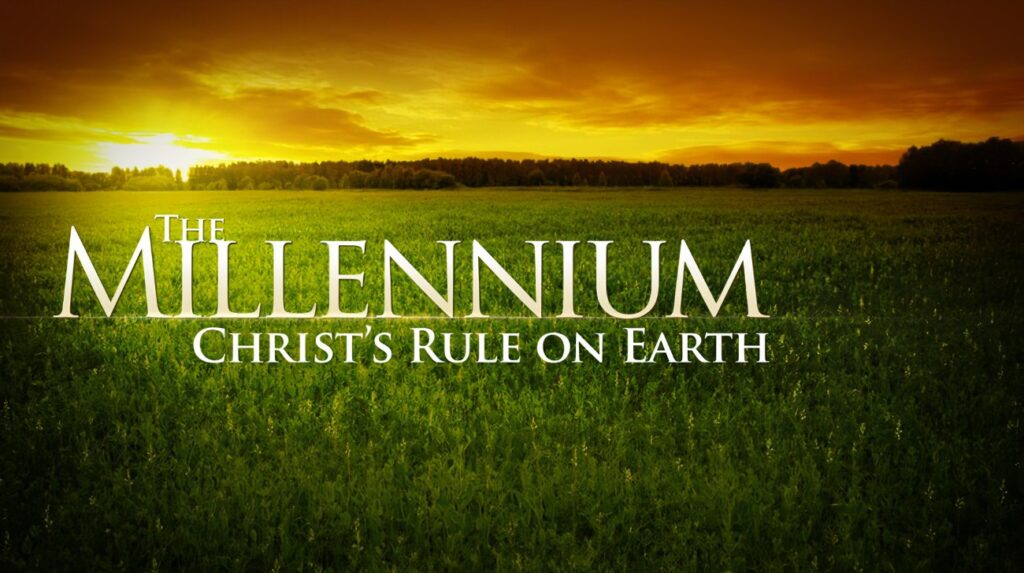Written by Lesallan Bostron
BIB3560 Revelation (ONLSP23)
Ohio Christian University
Pastor Alexander Soultz
May 8, 2023


The Millennium Paper
Revelation 20:1-7 (ESV) describes the Millennium as a thousand-year period that will begin when Jesus comes again in glory, and the nations distinct from Israel are destroyed. The word millennium is derived from Latin, meaning “thousand years” (Oxford Languages, 2023), and is mentioned six times in the book of Revelation (Revelation 20, ESV). In the book of Revelation, chapter nineteen, it is described as a period of time that follows the second coming of Jesus Christ to the earth and the ultimate destruction of the enemies of God (Revelation 19, ESV). During this time, Satan will be bound for a thousand years in a bottomless pit, shut up in it, and have a seal upon him during the time he is in that pit (Revelation 20:2-3, ESV). The meaning and timing of the Millennium is a topic of debate among three different eschatological schools of thought: Premillennialism, Amillennialism, and Postmillennialism (Bandy, 2020).
The first eschatological school of thought of premillennialism has many that hold this view believing that the Millennium is a literal thousand-year reign of Christ on earth that will happen after His second coming and before the final consummation of God’s redemptive purpose in the new heavens and the new earth of the age to come. The premillennialists hold that “Christ will return to inaugurate this time period” (Chou, 2015). Premillennialism holds that the Millennium cannot be equated with anything in the here and now since Christ has not yet returned. According to premillennialists, the promises made to Abraham for Israel and the world will be fulfilled in a future event. These promises are supported by Biblical passages such as Isaiah 11:1-16, 27:1-12, Hosea 1:7-11, 2:15-23, and Joel 3:1-21.
Premillennialists believe that these events will occur during the Millennium. The saints of the tribulation will be raised to reign with Him in the first resurrection (Revelation 20:5-6, ESV). According to Isaiah, the lion will lay down with the Lamb (Isaiah 11:6-8, ESV). Satan, the evil one, will be bound (Revelation 20:2, ESV). The earth will be as it was before the great fall, and it will again be fruitful (Isa 11:6–9; 65:20; Hos 2:21–23; Amos 9:13). Evil will exist on earth, but God will heavily restrict its effects (Chou, 2015). The view from premillennialists’ perspective believes that physical history and spiritual realities work together. Physical realities work together to bring us closer to the spiritual realities of the world today.
For this reason, God’s kingdom must be physical and spiritual. This is a promise of God found in the Old Testament books of Isaiah and Jeremiah. However, according to premillennialist beliefs, there is no reason to interpret the Lord’s future work in a spiritual sense. Instead, their view is that His purpose is to save human souls and demonstrate His reign over all creation (Chou, 2015).
The premillennialists use two different systems: dispensational premillennialism and historic premillennialism. John Nelson Darby formulated the theology of dispensational premillennialism in the 1800s. This view holds that the promises are fulfilled distinctly for the nation of Israel. The dispensational view divides Biblical history into a series of ages or dispensations. Historic premillennialism resembles the premillennialism position held during ancient times known as chiliasm (Bandy, 2020). Historic premillennialists believe that the church and Israel will experience these promises equally.
Furthermore, historic premillennialists believe that the current era will persist until a short tribulation phase. After this tribulation period, “Christ will return to earth to establish a millennial kingdom” (Bandy, 2020). Both of these premillennialist beliefs adhere to a chronological timeline and interpret Revelation 20:1-6, after the return of Christ and the final battle at Armageddon (Revelation 19:11-21, ESV).
The early church fathers (Papias, Justin Martyr, Irenaeus, Tertullian) have asserted that God has a planned period of time (1,000 years) to fulfill His promises. According to the premillennialist perspective, this belief is rooted in an age-old tradition founded on thoroughly interpreting the Bible.
The following view or perspective is that of Amillennialism, a view that can be characterized as the 1,000-year period that should be taken figuratively and not literally. Amillennialists also believe that the period of 1,000 years is a symbol for the “whole period of time between Jesus’ first and second comings” (Dodd, 1997). This view holds that the “Millennium” refers to spiritual events between Christ’s first and second comings. Amillennialism first refers to what happens when Christ has conquered Satan and bound Him at the cross (Beale, 1999). The saints can now share the message of the Lord Jesus Christ that it is a spiritual reality of Christ’s rule and the fulfillment of God’s promises. The saints can make disciples of all nations and people. In a spiritual sense, Christ is the ruler of heaven, and the saints share in His reign as they devote themselves to Him and work towards spreading the gospel to all nations, fulfilling the Great Commission (Matthew 28:16-20). According to Beale (1999), the “Millennium” refers to God’s spiritual handling of Evil within the church prior to the return of Christ. John’s writings and ideas may have aimed to symbolically convey God’s ultimate triumph through Christ. The Old Testament was approached by the New Testament apostles with some interpretive flexibility, allowing for a spiritual interpretation of Revelation 20:1-6 (ESV) as well.
The next interpretation is that of postmillennialism. According to postmillennialists, Christ will return after a period of time known as the Millennium, which is seen as a prosperous era where most of the world will have converted to Christianity. “Postmillennialism is the view or system of eschatology (doctrine of the last things) teaching that the current age is the Millennium, which is not necessarily a thousand years” (Demy & Ice, 2022). According to postmillennialists, Jesus Christ established His kingdom on earth during the first century through His teachings and redemptive actions. Postmillennialism believes that Jesus has equipped His church with the gospel, empowered the church with the Spirit, and charged the church with the Great Commission (Matthew 28:19) to make disciples of all nations. According to postmillennialism, there is a hopeful outlook on the future – that most people will be saved As gospel success grows, it will lead to a time before Christ’s return where faith, righteousness, peace, and prosperity will reign in the affairs of both individuals and nations. According to belief, Jesus Christ will return in a visible, bodily, and glorious manner after a prolonged period of such circumstances. According to this belief, the upcoming return will signify the conclusion of history, followed by the ultimate judgment and resurrection, resulting in the establishment of an everlasting order.
All three interpretations: postmillennialism, premillennialism, and Amillennialism, have strong points and weaknesses. Out of all the interpretations, the postmillennialism view of chapter twenty in the Book of Revelation is the most convincing to this student. According to this perspective, the return of Christ will take place after a period of prosperity known as the Millennium, during which Christian values will flourish. The postmillennialism interpretation suggests that many people living and yet to be born will eventually be saved. As gospel success grows, we can look forward to a time in history before Christ’s return when faith, righteousness, peace, and prosperity will become more prevalent in the world’s affairs. After an extended period of such events, the return of Jesus Christ will be a magnificent and tangible occurrence, ultimately concluding history with the ultimate judgment and universal resurrection, paving the way for the everlasting era.
References:
Bandy, A. S. (2020, September 10). Views of the Millennium. The Gospel Coalition. https://www.thegospelcoalition.org/essay/views-of-the-millennium/
Beale, G. K. (1999). Revelation: a commentary on the Greek text. W.B. Eerdmans.
Chou, A. (2015). “Millennialism.” In Lexham Bible Dictionary, edited by John D. Barry. Bellingham, WA: Lexham Press, 2015.
Demy, T. J., & Ice, T. (2022, April 28). What Is Postmillenialism? Crosswalk.com. https://www.crosswalk.com/faith/bible-study/what-is-postmillenialism.html
Dodd, B. J. (1997). “Millennium.” In Dictionary of the Later New Testament and Its Developments, edited by Ralph P. Martin and Peter H. Davids, pp. 738–41. Downers Grove, IL: Intervarsity, 1997.
Keener, C. S. (2014). The IVP Bible background commentary: New Testament. Intervarsity Press.
Logan, C. (2019). English Standard Version – Read Online. Bible Study Tools. https://www.biblestudytools.com/esv/
Oxford Languages. (2023). Oxford Dictionaries. Oxford Dictionaries; Oxford University Press. https://languages.oup.com/


